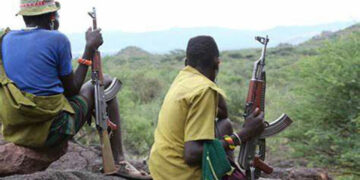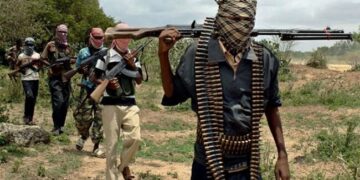Stakeholders in the security sectors, diplomacy and international relations have called for proper security agencies reforms in order for Nigeria to regain its past glory.
They made the call at the 3rd Wiser speaker’s forum in Abuja with the theme: “Assessing Nigeria’s diplomacy in regional and global peace and security.”
Speaking at the forum, the convener and president and founder of Whiteink Institute For Strategy Education And Research Nigeria, Brig. Gen. Saleh Bala (rtd) said “the whole intent of orgainsing these series of forum is to find important advisory points to share with the incoming administration and these series are about defence and security, diplomacy and a third one which is coming in next month will be looking at national cohesion and see how they will crystalise Nigeria’s power in order for us to be the old strong international player.”
He further said “consistently, the conclusion of the forum has been the reform of the defense and security architecture for them to be able to deal with our growing internal challenges which otherwise, we will not be able to rebuild our strong regional and global reputation of helping to find peace and stability around the world.”
He said Nigeria has become week in defense and diplomatic dealings, while approaching issues from divergent institutional approaches instead of strategic points and called for the strengthen of public institution across board.
Also speaking at the programme, group captain Sadeeq Garba Shehu (rtd) said the success of Western efforts to reform the militaries of Eastern Europe was predicated not on the capacity of Western forces to impose their will, but rather their ability to constructively engage their eastern brethren and use cooperation to bring about a mutually desirable outcome.
He further said: “To maintain her position in a new era of great power competition today, Nigeria needs to continue to invest in Defence Diplomacy and commit to the growth of security and stability abroad. Currently, Nigeria’s overseas military , diplomatic and economic engagement occur sporadically and somewhat independently. Instead, what is needed is a written, integrated military, economic, and social campaign plan to mitigate terrorism, migrant flows, and other non-state threats to security and prosperity around the world. Such an effort would, in fact, be connected to great power dynamics.”
Another speaker, Dr Onyinye Onwuka said, “In spite of ECOWAS’ efforts in maintaining peace, West Africa still grapples with significant security challenges. Terrorism, particularly from groups like Boko Haram and the Islamic State’s West African Province (ISWAP), continues to destabilize parts of Nigeria, Niger, Burkina Faso, and Mali. These groups exploit porous borders, social and economic grievances, high youth unemployment, and weak governance to recruit and expand their operations.
“The delay in the full implementation and funding of the Priority Action Plan to Eradicate Terrorism in the ECOWAS Region (2020-2024), and the lack of coordination of regional counter-terrorism initiatives such as the Lake Chad Basin Regional Stabilization Facility, the Accra Initiative, and the United Nations Integrated Strategy for the Sahel (UNISS), are some of the bottlenecks preventing effective action by ECOWAS and other stakeholders in the fight against terrorism in the region.”
Also speaking, Ambassador Usman Sarki, former deputy permanent secretary of Nigeria to the United Nations said: “Beyond West Africa, we have fresh crisis in the Sudan and growing instability in the Horn of Africa and the Great Lakes region particularly in eastern DRC. Libya is experiencing the calm of the grave yard and but it just dismissed its prime minister who has been in office only for one year. Somalia is a tinderbox and draught and climate change are causing havoc in the region with four sustained years of failing rains exposing about 20 million or more people to hunger and prolonged food insecurity. Floods have ravaged Mozambique, Malawi, DRC and other countries in the region.
“Responding to these situations and seeking to play any role by way of peace and security will be a tall order for Nigeria now or at any time in the future. We don’t have the reach, the might or the resources to undertake the required initiatives that a country like China could do. We have abdicated our prerogative to maintain order and provide security in Africa for about ten years now since our phased withdrawal from Darfur, Sudan, from 2014 or thereabout.”
Meanwhile, Ambassador Kenneth Nwachukwu, former Nigeria’s ambassador to Mali while speaking on Nigeria’s diplomacy performance in the recent times, there is need for improved policy formulations at protecting Nigeria’s diplomatic dealings.
He called for policies that would ensure that Nigeria’s interest in government and trade are respected and protected across the region and the world in general.
We’ve got the edge. Get real-time reports, breaking scoops, and exclusive angles delivered straight to your phone. Don’t settle for stale news. Join LEADERSHIP NEWS on WhatsApp for 24/7 updates →
Join Our WhatsApp Channel










